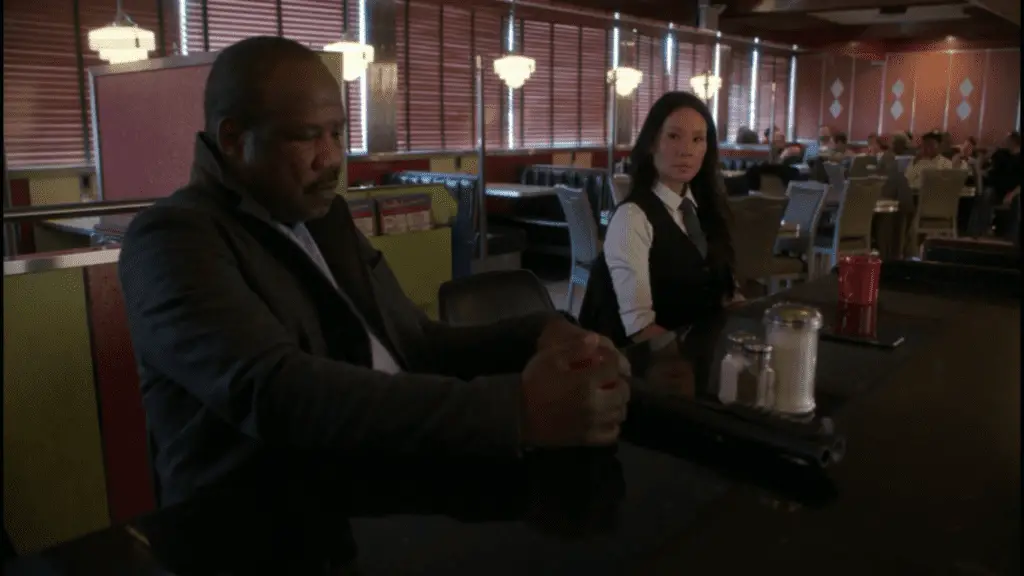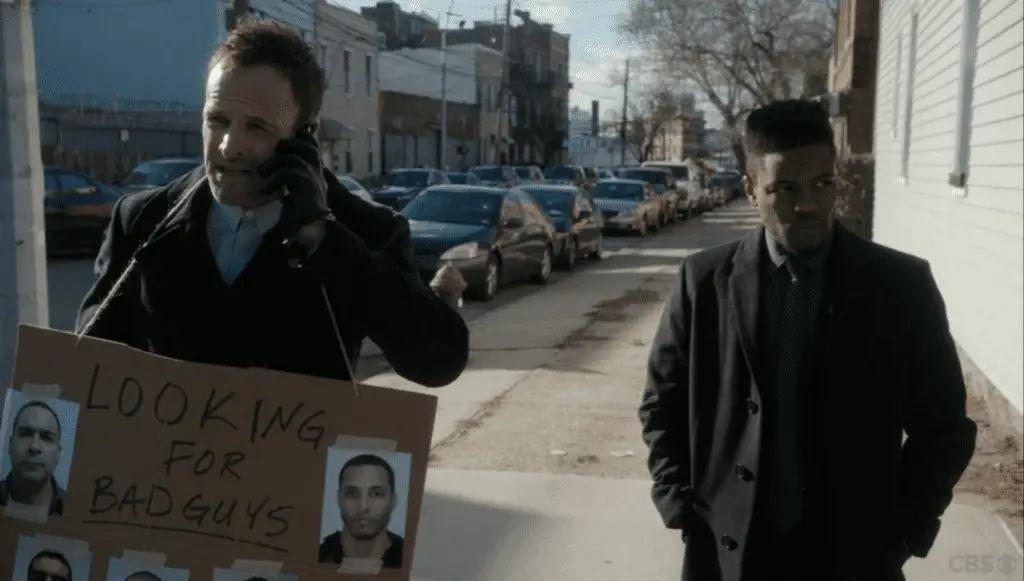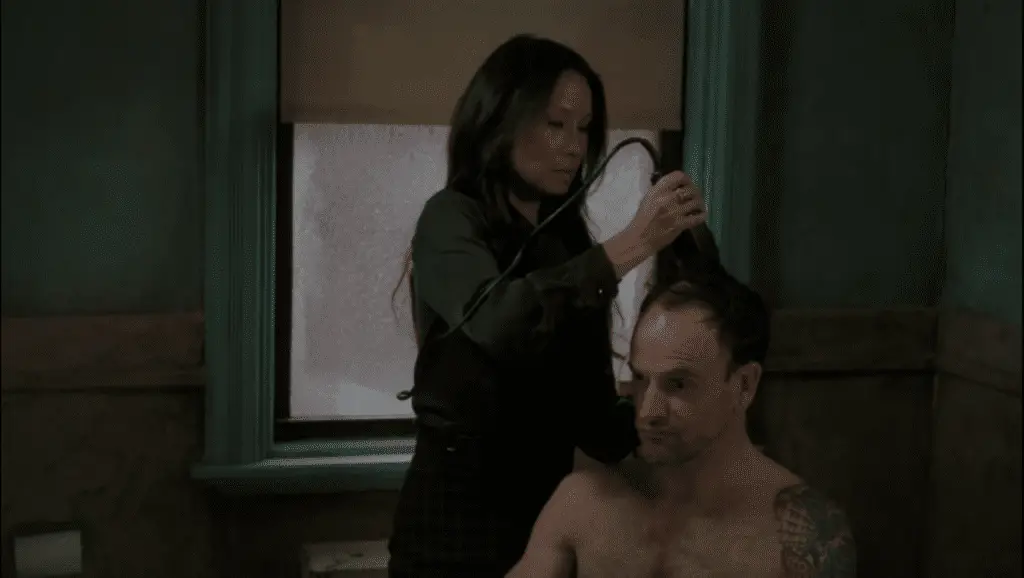Elementary shook things up this week with “Over the Barrel.” The episode opens with a series of flashbacks starting in 2014, in which Sherlock and Joan repeatedly brush off a man, Jack Burnelle, who is asking them to investigate the assault which he feels lead to the death of his adult son, Connor.
After being repeatedly rejected, Burnelle takes matters into his own hands and holds up a diner full of hostages, insisting that if Sherlock and Joan don’t solve the case, he’ll kill everyone in the diner. Time is an important factor in this story, as the statute of limitations on Connor’s case expires at midnight, giving Sherlock only about sixteen hours to solve the case. Worst of all, Burnelle takes Joan hostage, too, in order to give Sherlock extra motivation. Touchingly, Sherlock insists that he needs his partner to solve the crime. But Burnelle insists they can communicate by phone, and Sherlock leaves the diner alone.
Examining Connor’s old cell phone leads Sherlock and Bell to a former lover, who directs them to Connor’s old place of work, a warehouse where he was a night security guard. There, Sherlock realizes that Connor’s attack would have left the warehouse unguarded for the night, and theorizes that was the motivation for his attack. A garden variety mugging begins to look more serious.
Meanwhile, back at the diner, Joan deduces at Burnelle. She points out he hasn’t brought enough ammo to kill everyone in the diner and argues that he doesn’t really intend to go through with his threats. Her intention is presumably to convince Burnelle to surrender, but she only angers him. He admits that he doesn’t intend to kill everyone; in fact, he’s only there for one man. The detective who first handled Connor’s case is one of the hostages, and Burnelle holds him responsible.

Sherlock, in typical Sherlock fashion, has gotten his hands on some footage from a drone that was hovering over New York and the warehouse on the night of his attack. Thanks for the reminder that we live in a surveillance state, Elementary. You’re always good for that.
The footage reveals that on the night in question, a barge pulled up to the warehouse and unloaded a massive quantity of barrels that were then loaded into semis. The Elementary writers just can’t resist a pun in the title, can they? Based on the quantity of barrels, Sherlock thinks Connor’s assault may have been part of the largest smuggling heist in American history.
Bell and Sherlock track down the man responsible for the rental trucks in the footage, who leads them to a local gang, the Shoreline 99 (is it just me or does that sound like a terrible combination of Jersey Shore and Brooklyn 99?), who had been using his trucks. The Shoreliners have disappeared since the night of the smuggling. Bell remembers that Shoreline 99 had a rival gang, Santo Matón, who might know more. He attempts to reach out to them through official channels because, after all, they can’t just walk into gang territory with a sign that says “Looking for bad guys.”
You’d think Bell would know better by now.

Sherlock’s absurd sign quickly gains the attention of Santo Matón. They insist they are not responsible for the disappearance of Shoreline 99, and give Sherlock and Bell a new location to look for the Shoreline leader.
Joan has set forth on a new tactic with Burnelle, and observes that he has symptoms of skin cancer. But when she asks if that’s why he’s willing to take this risk, he answers that not only is he not afraid of death, but would prefer it over the pain of losing his son. So that’s comforting.
Sherlock and Bell uncover the location where the former Shoreliners have stored their massive cache of barrels. Sherlock persuades Bell to enter the building under somewhat…questionable justification. Then comes a twist that had actually literally made me gasp. When you watch a lot of crime dramas and murder mysteries, you start to be able to predict what’s going to happen. “Those barrels are full of drugs,” you say to yourself. “Or maybe gems. Ohh, illegal oil.” But no. It’s maple syrup. I did not expect maple syrup. I feel confident in saying that no one expected maple syrup. If you watch Bell carefully, I swear you can see him rolling his eyes.
Naturally, the next scene shows Sherlock surrounded by pancakes and syrup as Bell attempts to do Real Police Work. Sherlock explains the intricacies of syrup and why someone would want to illegally smuggle it, which Bell brushes off with, “Well, obviously.” I mean, who doesn’t know about syrup smuggling, right? Sherlock matches the smuggled syrup to syrup from a local restaurant, leading them to at last find and arrest one of the members of Shoreline 99.
This helpful criminal gives them more details about the Great Syrup Heist, including that it was all thought up by a friend of the Shoreline leader, Tyrell. This unnamed friend is the one who assaulted Connor. Unfortunately, the only one to know the identity of this friend was Tyrell, who is now conveniently dead.
Only 40 minutes remain to midnight.
Sherlock, clearly agitated, searches through old police records and actually finds someone who matches the limited description of Tyrell’s friend, who turns out to be someone they already encountered in their investigation. I don’t want to spoil the reveal, but let me say, I was very impressed that Elementary managed to completely surprise me twice in one episode. My detecting skills must be getting rusty. But it doesn’t matter; by the time Sherlock figures it out, it’s five minutes after midnight.
In the diner, a now visibly distressed Joan attempts to persuade Burnelle not to hurt anyone. The police realize they now have an opportunity to shoot Burnelle with a sniper. But when Gregson texts Joan this information, instead of manipulating him into position, she warns Burnelle and tearfully conveys her regret for Burnelle’s loss. If Lucy Liu cries and you don’t cry, this indicates that something is broken deep in your heart. She breaks through to Burnelle at last, and he surrenders to the police. In a brief but poignant scene outside the diner, Gregson asks Joan if she’s okay and she answers, “Not really.”
Later, at the brownstone, Joan (in her jammies, which was precious) finds Sherlock poring over Connor’s case files. He insists that he’s fascinated by the opportunity to defeat an as yet undefeated opponent: time itself. Yes, Sherlock, of course that’s all it is, I’m sure you aren’t feeling remotely guilty or uncomfortable over this case. This was only a small scene, but it was one of the moments that stood out the most to me. Sherlock and Joan were separated for most of the episode, so it was really powerful to see this moment of quiet platonic intimacy. Joan looks utterly comfortable in her pajamas, perching on the table, and Sherlock keeps his eyes locked on her the entire time and even smiles at a bad joke she makes. When they say good night, the words are loaded with the fear they must have both been feeling all day. 10/10, excellent Joan-Sherlock friendship moment.
The next morning, Sherlock smugly announces that, with the help of the hacker collective Everyone, he has found a way to defeat time and arrest Connor’s attacker. At the station, the team reveals to the perpetrator that due to Canadian hockey and a complicated legal term called tolling, there are actually 27 hours left on the statute of limitations for Connor’s case, and justice is reached at last.
In the final scene, Joan and Sherlock meet in the bathroom of the brownstone. It’s time to pay Sherlock’s dues to Everyone for their help, and they price they are asking is – brace yourselves because this is painful – his hair. After asking if he’s still sure, Joan begins to shave Sherlock’s head.

Now, I know that Jonny Lee Miller doesn’t have the bountiful curls of a certain other Sherlockian actor I could name, but I love Jonny’s hair. It’s a great bit of character building that generally Sherlock’s clothes are very neat but his hair is tousled and messy. It betrays a person who is very finicky and careful, but with a powerful, uncontained personality and plenty of anxiety tics. RIP, Jonny’s hair. I only hope that they don’t intend to keep his head buzzed. This was another demonstration of Sherlock and Joan’s bond, with him asking her to do it for him, absolutely trusting her to not hurt him, and rationalizing it with the explanation that they are, “partners in all things.”
But enough about his hair. Overall, I thought this was a great episode. To be honest, I haven’t been that impressed by this season before that episode. A lot of the things that I usually love about Elementary felt as if they were missing thus far. This episode, however, felt as if it really got back to what makes Elementary so good. There was no distracting side plot, and the central mystery was solid and compelling. Elementary usually attempts to deliver strange, twisty crimes, but I think sometimes they overreach and deliver bizarre red herrings and improbable coincidences. The syrup heist was definitely unique, but I found it believable, and all the clues naturally lead into each other. The separation of Joan and Sherlock added suspense, and was also a great opportunity to see some interaction between Sherlock and Bell, who have a fun relationship that mostly consists of, “Sherlock does something weird and Bell wonders why he puts up with this.” Bell was at his best in this episode, intelligent and tough one moment and amusingly exasperated the next. At the same time, Sherlock was visibly worried, yet still tossing off the quirky one liners that make up so much of his charm. Sherlock keeps a totem pole in the bathroom because it doesn’t fit in the closet. Obviously. You wouldn’t think that an episode where Joan is in constant mortal danger could be funny, but there were some great examples of Elementary’s humor. Plus, despite Sherlock and Joan being separated, we still got some great, sweet moments between the two of them. This episode pretty much hit all my markers for a good episode of Elementary. (Except Kitty wasn’t there. At any given moment, I am always wondering where Kitty is. When will my torment be ended, Elementary writers?)
There was one thing about this episode that I’m still not quite sure what to make of, and that’s the question of Sherlock and Joan’s culpability. Obviously, it’s not their fault that Burnelle decided on criminal activities. However, I think the opening sequence of the two repeatedly brushing off Burnelle is intentionally uncomfortable to watch and implies that they were wrong. But on the other hand, the rationales they provide for why they rejected Burnelle make sense. Yes, Connor’s assault did turn out to be part of a strange and important crime. But on the surface, it looked like an ordinary mugging, and they had murders to solve. The two of them alone cannot solve every crime in existence, and it’s not fair to blame them for that. Nor do either of them ever explicitly blame themselves. Joan tells Burnelle that she’s sorry for Connor’s death, but she never apologizes for not taking on the case. Sherlock barely even acknowledges it, although I do think his continued fixation on arresting the attacker suggests some feelings of guilt or at least discomfort. As for what the show wants you to think, there is no obvious clue. Do the writers think that Joan or Sherlock are in the wrong or not? I honestly do not know. It leaves the episode feeling a unresolved that this question is never addressed, but maybe that’s the point. It’s a complex moral question that has real world implications, considering that crimes are frequently unsolved (particularly when they involve minority victims, as this case does), so it’s left up to the audience to decide for themselves what they think. It’s impossible to solve every crime. But is it wrong to not even try? Is it wrong to decide that some lives mean more than others? Or is that just a practical way of dealing with an imperfect world?

